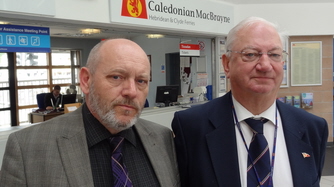Ferry company Cal Mac is drawing up contingency plans for three days of industrial action next week.
Catering staff, deck and engine room ratings belonging to the RMT union have overwhelmingly voted to act in protest of cuts to their job conditions and pensions.
Talks between both sides in Glasgow on Thursday failed to resolve the row. A further bid to avert the strike has been scheduled for Monday.
A 24-
The walkout clashes with the start of the Western Isles school summer holidays.
Cal Mac will phone around crew members to try and figure out how many will turn up for work next Friday.
Navigating and engine room officers belong to a different union and will work as normal.
However, ships have a legal safe manning level and will be stuck in harbour unless the minimum number of personnel in each section is working.
Chief engineers will be under pressure not to have any breakdowns or technical delays on Wednesday and Thursday as crews may not work overtime.
Speedy turnaround times in port will be key to keep the ship on time and on schedule
-
RMT fears the state-
Serco is Cal Mac's only competitor in the bidding war for a £1 billion funding package to run the ferry service.
Over 90% of the 350 union members who took part in a ballot voted for strikes and other industrial action.
Martin Dorchester, chief executive of Cal Mac, said the ferry firm is drawing up plans “as best they could” to try and minimise disruption.
Mr Dorchester said he is “very disappointed” the RMT union announced a strike and
a work-
Contingency plans will be “fluid until we know for definite what is happening and who on the day is going to turn to for work.”
He added: “We will phone round on the day to see who is going to turn up for work.”
Mr Dorchester pointed out ferries were regularly used to “responding on the spot
to run-
However, on these occasions, seafarers on leave are often called back to their vessel. This time the RMT urges union members on leave to stay at home.
David McGibbon, chairman of Cal Mac Ferries, said they hoped to “continue constructive dialogue” with the staff and unions over pension reforms.
Mr McGibbon said: “You have to bear in mind we have started a consultation process with the unions. We are talking to the unions, all staff and union members.
“The changes -
He highlighted: “Only about 15% of defined benefit pension schemes in the whole of the UK are still open. The rest have moved on less favourable schemes.
“Cal Mac’s scheme will still be open and will be a very good scheme.”
Cal Mac making contingency plans for ferry strike
18 June 2015

Cal Mac Ferries' bosses: Martin Dorchester, (R) chief executive and David McGibbon, (L) chairman.